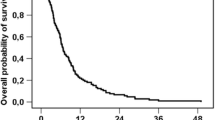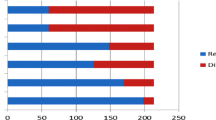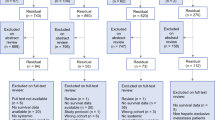Abstract
Purpose
This study was designed to evaluate overall survival after radioembolization or best supportive care (BSC) in patients with chemotherapy-refractory liver-dominant metastatic colorectal cancer (mCRC).
Methods
This was a matched-pair comparison of patients who received radioembolization plus BSC or BSC alone for extensive liver disease. Twenty-nine patients who received radioembolization were retrospectively matched with a contemporary cohort of >500 patients who received BSC from 3 centers in Germany. Using clinical databases, patients were initially matched for prior treatments and tumor burden and then 29 patients were consecutively identified with two or more of four matching criteria: synchronous/metachronous metastases, tumor burden, increased ALP, and/or CEA >200 U/ml. Survival was calculated from date of progression before radioembolization or BSC by using Kaplan–Meier analysis.
Results
Of 29 patients in each study arm, 16 pairs (55.2%) matched for all four criteria, and 11 pairs (37.9%) matched three criteria. Patients in both groups had a similar performance status (Karnofsky index, median 80% [range, 60–100%]). Compared with BSC alone, radioembolization prolonged survival (median, 8.3 vs. 3.5 months; P < 0.001) with a hazard ratio of 0.3 (95% confidence interval, 0.16–0.55; P < 0.001) in a multivariate Cox proportional hazard model. Treatment-related adverse events following radioembolization included: grade 1–2 fatigue (n = 20, 69%), grade 1 abdominal pain/nausea (n = 14, 48.3%), and grade 2 gastrointestinal ulceration (n = 3, 10.3%). Three cases of grade 3 radiation-induced liver disease were symptomatically managed.
Conclusions
Radioembolization offers a promising addition to BSC in treatment-refractory patients for whom there are limited options. Survival was prolonged and adverse events were generally mild-to-moderate in nature and manageable.

Similar content being viewed by others
References
Europe against Colorectal Cancer Declaration of Brussels 9 May 2007. http://www.future-health-2007.com/fileadmin/user_upload/Brussels_Declaration.pdf. Accessed July 2009
Lepage C, Remontet L, Launoy G et al (2008) French network of cancer registries (FRANCIM). Trends in incidence of digestive cancers in France. Eur J Cancer Prev 17:13–17
Manfredi S, Lepage C, Hatem C et al (2006) Epidemiology and management of liver metastases from colorectal cancer. Ann Surg 244:254–259
Golfinopoulos V, Salanti G, Pavlidis N, Ioannidis JP (2007) Survival and disease-progression benefits with treatment regimens for advanced colorectal cancer: a meta-analysis. Lancet Oncol 8:898–911
Folprecht G, Grothey A, Alberts S et al (2005) Neoadjuvant treatment of unresectable colorectal liver metastases: correlation between tumour response and resection rates. Ann Oncol 16:1311–1319
Nordlinger B, Sorbye H, Glimelius B et al (2008) Perioperative chemotherapy with FOLFOX4 and surgery versus surgery alone for resectable liver metastases from colorectal cancer (EORTC Intergroup trial 40983): a randomised controlled trial. Lancet 371:1007–1016
Grothey A, Sugrue MM, Purdie DM et al (2008) Bevacizumab beyond first progression is associated with prolonged overall survival in metastatic colorectal cancer: results from a large observational cohort study (BriTE). J Clin Oncol 26:5326–5334
Tol J, Koopman M, Cats A et al (2009) Chemotherapy, bevacizumab, and cetuximab in metastatic colorectal cancer. N Engl J Med 360:563–572
Gervais DA, Goldberg SN, Brown DB et al (2009) Society of interventional radiology position statement on percutaneous radiofrequency ablation for the treatment of liver tumors. J Vasc Interv Radiol 20(7 Suppl):S342–S347
Popescu I, Alexandrescu S, Croitoru A, Boros M (2009) Strategies to convert to resectability the initially unresectable colorectal liver metastases. Hepatogastroenterology 56:739–744
Ricke J, Wust P, Wieners G et al (2005) Liver malignancies: CT-guided interstitial brachytherapy in patients with unfavourable lesions for thermal ablation. J Vasc Interv Radiol 15:1279–1286
Denecke T, Lopez, Hänninen E (2008) Brachytherapy of liver metastases. Recent Results Cancer Res 177:95–104
Kennedy A, Coldwell D, Nutting C et al (2006) Resin 90Y microsphere brachytherapy for unresectable colorectal metastases: modern USA experience. Int J Radiat Oncol Biol Phys 65:412–425
Cosimelli M, Golfieri R, Cagol PP et al (2010) Multi-centre phase II clinical trial of yttrium-90 resin microspheres alone in unresectable, chemotherapy refractory colorectal liver metastases. Br J Cancer 103:324–331
Jakobs TF, Hoffmann RT, Dehm K et al (2008) Hepatic yttrium-90 radioembolization of chemotherapy-refractory colorectal cancer liver metastases. J Vasc Interv Radiol 19:1187–1195
Hoffmann RT, Jakobs TF, Kubisch C et al (2010) Radiofrequency ablation after selective internal radiation therapy with Yttrium90 microspheres in metastatic liver disease–is it feasible? Eur J Radiol 74:199–205
Van den Eynde M, Flamen P, El Nakadi I et al (2008) Inducing resectability of chemotherapy refractory colorectal liver metastasis by radioembolization with yttrium-90 microspheres. Clin Nucl Med 33:697–699
Denecke T, Rühl R, Hildebrandt B et al (2008) Planning transarterial radioembolization of colorectal liver metastases with Yttrium 90 microspheres: evaluation of a sequential diagnostic approach using radiologic and nuclear medicine imaging techniques. Eur Radiol 18:892–902
Saltz L, Meropol N, Loehrer P et al (2004) Phase II trial of cetuximab in patients with refractory colorectal cancer that expresses the epidermal growth factor receptor. J Clin Oncol 22:1201–1208
Sangro B, Gil-Alzugaray B, Rodriguez J et al (2008) Liver disease induced by radioembolization of liver tumors: description and possible risk factors. Cancer 112:1538–1546
Hendlisz A, Van den Eynde M, Peeters M et al (2010) Phase III trial comparing protracted intravenous fluorouracil infusion alone or with yttrium-90 resin microspheres radioembolization for liver-limited metastatic colorectal cancer refractory to standard chemotherapy. J Clin Oncol 28:3687–3694
Dawood O, Mahadevan A, Goodman KA (2009) Stereotactic body radiation therapy for liver metastases. Eur J Cancer 45:2947–2959
Jonker DJ, O’Callaghan CJ, Karapetis CS et al (2007) Cetuximab for the treatment of colorectal cancer. N Engl J Med 357:2040–2048
Van Cutsem E, Peeters M, Siena S et al (2007) Open-label phase III trial of panitumumab plus best supportive care compared with best supportive care alone in patients with chemotherapy-refractory metastatic colorectal cancer. J Clin Oncol 25:1658–1664
van Hazel G, Blackwell A, Anderson J et al (2004) Randomised phase 2 trial of SIR-Spheres plus fluorouracil/leucovorin chemotherapy versus fluorouracil/leucovorin chemotherapy alone in advanced colorectal cancer. J Surg Oncol 88:78–85
Sharma R, van Hazel G, Morgan B et al (2007) Radioembolization of liver metastases from colorectal cancer using yttrium-90 microspheres with concomitant systemic oxaliplatin, fluorouracil, and leucovorin chemotherapy. J Clin Oncol 25:1099–1106
van Hazel GA, Pavlakis N, Goldstein D et al (2009) Treatment of fluorouracil-refractory patients with liver metastases from colorectal cancer by using Yttrium-90 resin microspheres plus concomitant systemic irinotecan chemotherapy. J Clin Oncol 27:4089–4095
Kuebler JP (2009) Radioembolization of liver metastases in patients with colorectal cancer: A nonsurgical treatment with combined modality potential. J Clin Oncol 27:4041–4042
Rose SC, Gulec SA (2009) Yttrium 90 radiomicrosphere therapy: ongoing clinical trials. J Interv Oncol 2:72–83
Acknowledgments
The authors thank the patients who participated in this study. We also thank Rae Hobbs for her editorial assistance on this manuscript, courtesy of Sirtex Medical Ltd. This trial was supported in part by Sirtex Medical Limited, Sydney, Australia. Ricarda Seidensticker and Max Seidensticker received travel fees. Jens Ricke and Maciej Pech received research grants and consultant fees from Sirtex Medical Limited, Sydney, Australia.
Conflict of interest
All other authors disclose any actual or potential conflict of interest.
Author information
Authors and Affiliations
Corresponding author
Rights and permissions
About this article
Cite this article
Seidensticker, R., Denecke, T., Kraus, P. et al. Matched-Pair Comparison of Radioembolization Plus Best Supportive Care Versus Best Supportive Care Alone for Chemotherapy Refractory Liver-Dominant Colorectal Metastases. Cardiovasc Intervent Radiol 35, 1066–1073 (2012). https://doi.org/10.1007/s00270-011-0234-7
Received:
Accepted:
Published:
Issue Date:
DOI: https://doi.org/10.1007/s00270-011-0234-7




